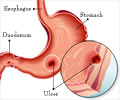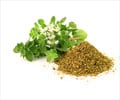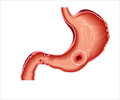Diseases Associated with Helicobacter pylori
Duodenal ulcer
H. pylori is the major cause of duodenal ulcer. Duodenal peptic ulcers occur in the first part of the intestine, one or two inches past the end of the stomach. Symptoms include indigestion and upper abdominal pain with occasional bleeding. Duodenal ulcers can be treated with antacids or drugs such as Tagamet, Zantac, or Pepcid.
Gastric (Stomach) Ulcers
Stomach ulcer shave two causes. The most common cause is H. pylori infection of the stomach. Stomach ulcers behave similar to duodenal ulcers, however stomach ulcers are more complicated than duodenal ulcers. The effectiveness of antibiotic treatment for stomach ulcers appears to be similar to that seen in duodenal ulcers (cure rate 70-90% if H. pylori are eradicated). About 30% of stomach ulcer are not caused by H. pylori but are due to the corrosive effect of aspirin type medications, which are taken for conditions like arthritis.
Stomach Cancer
Stomach cancers (gastric adenocarcinomas) are often associated with H. pylori (70-90%). The presence of H. pylori confers an approximately six fold risk of gastric cancer, accounting for about half of all gastric cancers.
Gastric cancer can be classified as - intestinal type (well differentiated adenocarcinoma) and diffuse (cygnet ring or poorly differentiated type). Intestinal cancers usually appear to form lumpy tumors but the diffuse type is more likely to spread to the stomach wall. H. pylori may cause Mucosa associated lymphoid tissue (MALT), which becomes malignant to form low grade lymphoma of the stomach.
Non-ulcer Dyspepsia
Dyspepsia is a pain or an uncomfortable feeling in the upper middle part of stomach in patients with H. pylori infection.
Weird Syndromes
Weird skin rashes are characterized by a red skin rash on the face. The symptoms occur due to an autoimmune disease caused by H. pylori antibodies, however the symptoms disappear when H. pylori infection is treated.



















